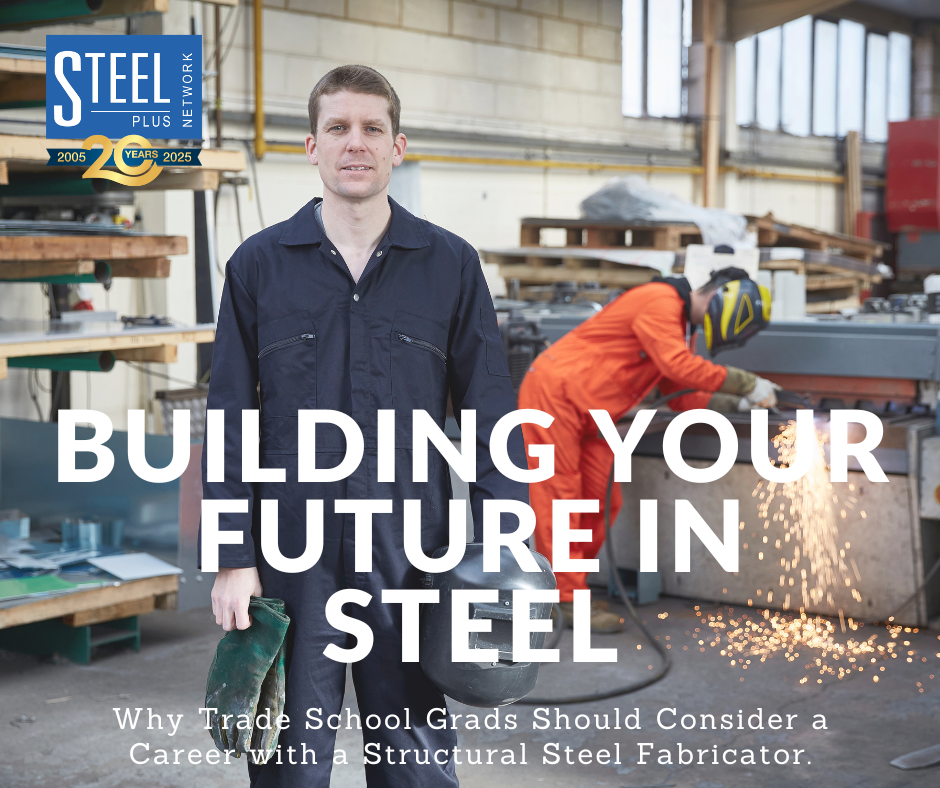Building Your Future in Steel: Why Trade School Grads Should Consider a Career with a Structural Steel Fabricator
10 Apr 2025
By Colleen Blackmore-Doucette, President

If you’re a recent trade school graduate – or about to be – there’s a world of opportunity waiting for you in structural steel fabrication. It’s a field where your hands-on training, technical knowledge, and work ethic can translate into a rewarding and stable career. Whether your background is in welding, machining, drafting, or construction technologies, structural steel fabricators are always on the lookout for skilled professionals to help shape the skylines of tomorrow.
Here’s why joining a structural steel fabricator could be the best next step in your career—and how you can prepare to make it happen.
Why Structural Steel Fabrication?
Structural steel is the backbone of modern construction. From commercial high-rises and sports arenas to bridges and industrial plants, steel fabricators turn architectural blueprints into real-world structures. And as a graduate from a trade program, you’re already equipped with many of the skills employers in this industry need.
1. Strong Job Security
The demand for skilled tradespeople in steel fabrication is steady—and growing. As infrastructure ages and urban development surges, more projects are calling for complex, custom steel structures. Fabricators are investing in skilled talent to meet this demand, especially in areas like welding, CNC machining, and quality control.
2. High Earning Potential
Entry-level positions in steel fabrication often start with competitive wages, and with a few years of experience, the potential to advance into higher-paying roles like lead welder, quality inspector, or foreman is significant. Overtime and union opportunities can also boost your income.
3. Clear Career Pathways
Structural steel fabricators typically offer clear advancement opportunities. Starting in the shop, you might move into supervisory positions, quality assurance, drafting and detailing (especially if you have CAD skills), or project management. It’s a field where career growth is based on skill, dedication, and learning – not just a four-year degree.
4. Satisfaction You Can See
There’s something incredibly rewarding about working in steel – you get to build things that last. When you drive past a building or a bridge you helped fabricate, you can proudly say, “I made that.” Not many careers offer such a visible impact.
What Roles Are Available?
Depending on your specific training, here are a few common positions trade school grads can step into:
- Welder/Fitter – Joining steel components according to detailed plans and specs.
- Machine Operator – Running CNC machines, saws, and other cutting/forming equipment.
- Layout Technician – Reading blueprints and preparing steel components for assembly.
- Drafting & Detailing Assistant – Using CAD software to create fabrication drawings.
- Quality Control Inspector – Ensuring each piece meets code and customer standards.
- Material Handler – Moving, storing, and organizing steel components efficiently.
How to Prepare for a Career in Steel Fabrication
If you’re interested in this field, here’s how to get a head start:
✅ Sharpen Your Technical Skills
Keep honing your welding, blueprint reading, and measurement skills. If you’re trained in CAD, even better – many fabricators are looking for drafters with shop experience.
✅ Get Certified
Certifications from CWB (Canadian Welding Bureau) or the AWS (American Welding Society) can give you a major edge. Many fabricators will even pay for additional training once you’re on the job.
✅ Understand the Industry
Familiarize yourself with how a fabrication shop works. Learn the flow from raw materials to finished product, and how different trades (welders, detailers, inspectors) interact to complete a project.
✅ Visit Local Fabricators
Reach out to local companies and ask if they offer tours, apprenticeships, or entry-level opportunities. Showing initiative and interest goes a long way.
✅ Build Soft Skills
Reliability, attention to detail, and the ability to work in a team are just as important as technical knowledge. Fabrication work is collaborative – being a good communicator matters.
Final Thoughts
Trade school has set you up with a powerful foundation. Now, it’s time to build on it – literally. A career with a structural steel fabricator offers not just a paycheck, but a path. You’ll be part of an essential industry, solving real problems, and creating something tangible every day.
If you’re ready to turn blueprints into buildings and skills into a solid future, the steel fabrication world is ready for you.

